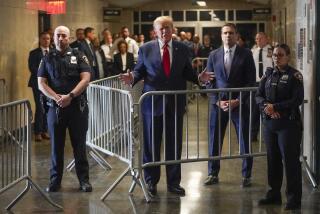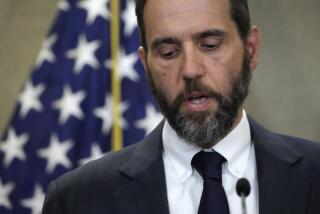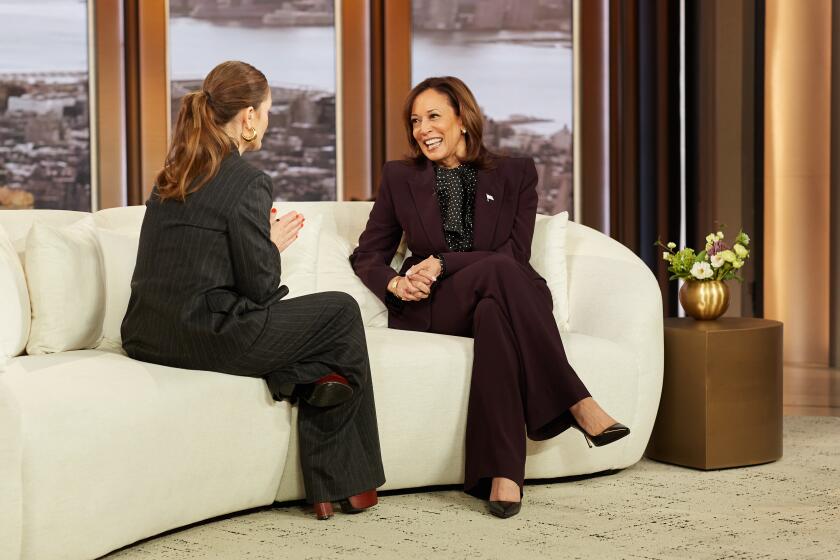High Court Refuses a Quick Ruling in Setback for Starr
The Supreme Court dealt a setback to independent counsel Kenneth W. Starr on Thursday, refusing his request for a quick ruling that could have forced White House lawyers and Secret Service officials to answer prosecutors’ questions before a grand jury in the Monica S. Lewinsky case.
Rebuffing Starr’s claim of a constitutional crisis virtually “unparalleled in the history of the Republic,” the justices issued a decidedly low-key, two-line order saying that the twin legal cases should follow the normal judicial course.
Rather than allow Starr to leapfrog the U.S. Appeals Court here, the justices said, they would await a ruling from the lower court.
“It is assumed the Court of Appeals will proceed expeditiously,” the justices said.
Both cases raise new and largely unresolved legal issues. One concerns the circumstances under which government lawyers are entitled to speak in confidence with their clients--in this instance, the president of the United States. The other tests whether the officials who guard the president’s life can be compelled to testify against him in a criminal case.
Thursday’s court order means that it will be months from now, and perhaps well into next year, before Starr can demand testimony from Clinton confidant Bruce R. Lindsey, two uniformed Secret Service officers who worked near the Oval Office and a Secret Service lawyer on what they know about the nature of Clinton’s relationship with the former White House intern and whether Clinton or Lewinsky has lied under oath or sought unlawfully to cover up what happened.
The Supreme Court’s refusal to get involved immediately may have the effect of increasing, if slightly, the leverage Lewinsky has in negotiating an immunity agreement from Starr’s office. Without the Secret Service officials’ testimony, in particular, the value to Starr of securing Lewinsky’s testimony may be elevated.
Lewinsky conferred at length Thursday with her new legal team, as she has done each day since she dismissed William H. Ginsburg, her lawyer from Los Angeles.
Testimony from Secret Service officials would give the grand jury another means by which to measure the truthfulness of Clinton’s sworn denial of ever having engaged in sex with Lewinsky or having been alone with her.
The prosecutors want Lindsey, a deputy White House counsel, to answer all their questions about his knowledge of the president’s relationship with Lewinsky. Lindsey, with Clinton’s backing, had asserted both executive privilege and attorney-client privilege in declining to answer certain questions.
Starr won significant victories last month when U.S. District Court Judge Norma Holloway Johnson ruled in his favor on the privilege matters.
Johnson rejected the position of Clinton administration lawyers, who had argued that allowing questioning of Secret Service officials would cause Clinton or future presidents to withdraw from their protectors, increasing the chance of assassination.
As for Lindsey, Judge Johnson ruled that the grand jury’s need for information took precedence over the executive privilege and attorney-client privilege claims.
Last week, Starr filed his request for a quick review of the Clinton administration’s expected appeals of Judge Johnson’s rulings.
“This office’s investigation regarding Monica S. Lewinsky is a matter of extraordinary national importance,” Starr asserted, comparing the situation with the high court’s refusal to grant an executive privilege claim by President Richard Nixon, thus forcing him to surrender incriminating White House tapes during the Watergate scandal. On Tuesday, Starr filed a second appeal on the Secret Service issue.
Clinton on Tuesday announced through White House lawyers that he would drop his assertion of executive privilege but would continue to resist the unfettered questioning of Lindsey on grounds of the attorney-client privilege.
“Once the executive privilege question was off the table, it didn’t look like the kind of extraordinary case they [the justices] needed to take,” said veteran Supreme Court attorney Carter G. Phillips.
Left unprotected by that tactical retreat was White House strategist Sidney Blumenthal, a former journalist who has helped map aggressive White House attacks on Starr and his deputies. On Thursday, he was back before the grand jury, accompanied by personal lawyers and a White House lawyer, Cheryl D. Mills.
Now the privilege issue will go to a three-judge panel of the U.S. Court of Appeals. It could hear arguments soon and rule quickly on the issues, possibly by late summer.
If the White House loses, its lawyers could ask the full 11-member Appeals Court to reconsider the issue. If that fails, too, under normal rules the White House could take 90 days to appeal the issue to the Supreme Court.
Unless the justices intervene to speed the cases along, it likely would be late fall before an appeal could come before them. If they agreed to hear the issues, a final ruling probably would not come until the spring of 1999.
Either way, the court’s rejection suggests that there is no end in sight to Starr’s inquiry. Starr was named independent counsel in the Whitewater investigation in August 1994.
After spending years investigating whether the president and First Lady Hillary Rodham Clinton used their influence illegally to win financial favors in Arkansas, the suicide of White House aide Vincent Foster, alleged improprieties in the White House travel office and allegations that the Clinton White House misused FBI files, as well as other matters, Starr in January began investigating the Clinton-Lewinsky matter.
Since then, both Starr’s office and the White House repeatedly have blamed the other for the pace of the inquiry and they did so again Thursday.
Starr’s office said that he urged fast action by the Supreme Court because the White House had used an assortment of legal privileges to avoid telling the truth and to drag out the process.
“In light of the Supreme Court’s determination today, we will proceed to litigate these issues as quickly as the Court of Appeals’ schedule will permit,” Starr said in a statement.
White House Press Secretary Mike McCurry blamed Starr for the extraordinary time, money and distraction of the inquiry. “Today is Day 1,400 of Ken Starr’s tenure as independent counsel at the rate of $30,000 a day of taxpayers’ money,” McCurry said.
White House officials applauded the Supreme Court’s decision on government attorney-client privilege and reiterated that the president is taking no stand on the issue of Secret Service testimony.
“The Supreme Court acted appropriately today, rejecting Mr. Starr’s attempt to bypass the traditional appeals process on the subject of attorney-client privilege,” said White House Counsel Charles F.C. Ruff.
Several legal experts said that Starr, a former judge and U.S. solicitor general, may have overplayed his hand with the Supreme Court.
Only five times in its history has the Supreme Court taken up a matter on an emergency basis before a ruling in the appellate courts. In one instance during the Korean War, President Truman ordered the Army to seize the nation’s steel mills to prevent a strike. The Supreme Court agreed to intervene, heard arguments and reversed Truman’s order.
“This is not the steel seizure case or something of that magnitude,” said American University law professor Thomas Sargentich, an expert on the separation of powers. “I’m not surprised that they turned him down. It’s very unusual for the court to take up a case which has not been reviewed below. They are afraid of making a mistake if they act in a vacuum and under pressure.”
On Monday, the justices will sit in a special session to hear arguments on another matter brought by Starr--whether he can obtain notes taken five years ago by a lawyer for Foster.
Starr has insisted that the notes are essential to his investigation and he urged the court to act quickly on the case. Normally, such notes and conversations between a lawyer and a client are shielded by the traditional attorney-client privilege. However, in this case, Starr asserts that the privilege of confidentiality died with the client.
Nine days after speaking with attorney James Hamilton, Foster committed suicide in July 1993.
Times staff writer Dennis Freeman contributed to this story.
More to Read
Get the L.A. Times Politics newsletter
Deeply reported insights into legislation, politics and policy from Sacramento, Washington and beyond. In your inbox three times per week.
You may occasionally receive promotional content from the Los Angeles Times.








